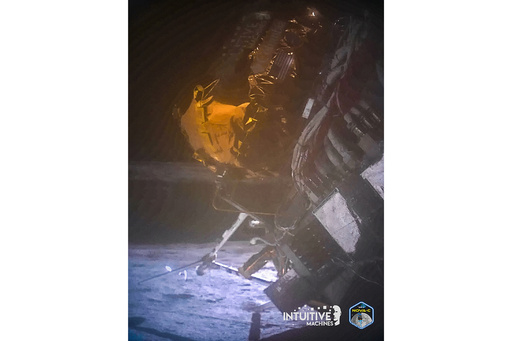CAPE CANAVERAL, Fla. (AP) — The first private U.S. spacecraft to land on the moon broke a leg at touchdown before falling over, according to company officials who said Wednesday it was on the verge of losing power.
Intuitive Machines, the company that built the lander, released new photos Wednesday, six days after the landing, that showed at least one broken leg on the six-legged spacecraft. The lander came in too fast, skidded and tumbled over as it touched down near the moon’s south pole last Thursday, hampering communications and power. It was supposed to operate for at least a week.
CEO Steve Altemus said the lander, named Odysseus, was still alive and generating solar power but expected to go silent soon. Late Wednesday night, the company said the lander might linger into Thursday.
When the end comes, Altemus said, flight controllers would “tuck Odie in for the cold night of the moon” so in two to three weeks, once lunar night lifts, they can try to regain contact.
Mission director Tim Crain said it’s uncertain if Odysseus will wake up. The extreme cold of the lunar night could crack the electronics and kill the batteries.
“Lunar night is no joke,” Crain said on X, formerly Twitter. “Imagine leaving your favorite electronics outside for 14 nights in Antarctica!”
The mission was the first U.S. moon landing in more than 50 years and only the second under NASA’s commercial program for lunar deliveries. But it far outpaced a rival’s failed effort last month; that lander had a fuel leak and came crashing back to Earth.
Because of a last-minute switch from the lander’s inactive navigation system to NASA’s experimental guidance lasers on board, Odysseus missed its desired flat terrain by 1 mile (1.5 kilometers) and ended up at a higher elevation than anticipated. As a result, it was descending too fast and hit harder than the legs could tolerate, according to Altemus. The 14-foot (4.3-meter) lander momentarily stood upright, its engine firing, before slowly falling onto a slight slope.
Worker error before the flight made the lander’s navigation system unusable.
NASA Administrator Bill Nelson said he considers the Odysseus mission a success, given that all six of the space agency’s experiments on the lander were still working as of Wednesday morning, six days into what should have been eight days of operations. But he noted: “There’s a big difference on landing a crew and landing a bunch of instruments.”
The space agency paid Intuitive Machines $118 million to fly its experiments to the hilly and shadowed south polar region. That’s where NASA plans to land astronauts in another few years as part of its Artemis program, named after Apollo’s mythological twin sister.
It was the first moon landing of a U.S. spacecraft since the Apollo program. NASA safely landed 12 astronauts on the moon from 1969 through 1972, then withdrew from surface operations until Odysseus’ arrival last Thursday.
Odysseus carried an Apollo-era U.S. flag donated by NASA. The lander also had other customers’ items on board, including new jacket insulating fabric from Columbia Sportswear, mini moon sculptures by Jeff Koons and a set of cameras from Embry-Riddle Aeronautical University. The cameras were belatedly ejected Tuesday in an unsuccessful attempt to photograph the sideways lander.
Intuitive Machines is the first private business to pull off a moon landing, a feat previously achieved by only five countries. Japan was the latest country to score a landing, but its lander also ended up on its side last month. This week, Japan’s space agency said its lander made it through a lunar night.
NASA’s Joel Kearns stressed the U.S. landing represented “a flight test, a first step to get back to the moon,” with more commercial missions ahead.
___
The Associated Press Health and Science Department receives support from the Howard Hughes Medical Institute’s Science and Educational Media Group. The AP is solely responsible for all content.


